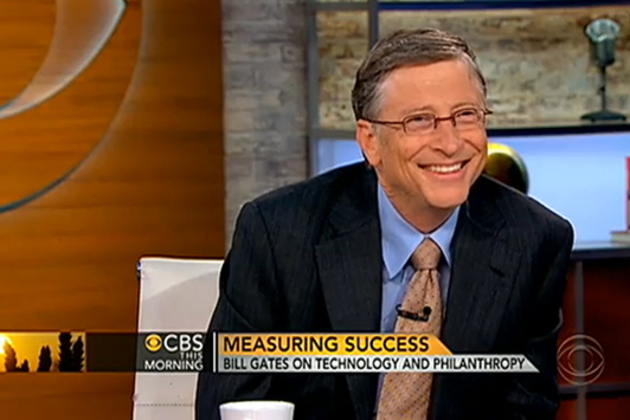
In a recent interview with CBS This Morning's Charlie Rose, Bill gates admitted he wasn't happy with Microsoft's strategy in mobile. Gates said "We didn't miss cell phones, but the way that we went about it didn't allow us to get the leadership, so it's clearly a mistake."
Sharp words for a platform that could use all the protection it can get in 2013.
There are a few reasons Bill Gates might open up about Microsoft and the way it missed an opportunity in the smartphone arena.
First, he could have simply wanted to get his word on record. As former CEO of Microsoft, his opinion as Chairman of Microsoft is just as important to the company's future as his opinion was in the former position.
Secondly, Microsoft is not the sort of company to sit back and wait for the "next," so Gates wanted to address the shortcomings and move on. Try and count how many times he says the word "innovation" in his interview with Charlie Rose, and you'll get an idea of his expectations.
The last reason Gates would come clean on Windows Mobile and Windows Phone would be to admit defeat, for lack of a better word. To say 2.9% total market share in mobile is acceptable since coming to fruition in October 2010 would be masochistic.
2013 is a new year after all.
As a Windows Phone 8 fan, I can honestly say that my concerns for their future are deeply rooted. Windows Phone is by and large a fast follower. It paid off in the short-run. They capitalized on BlackBerry's absence in mobile and have gained plenty of support in the process. However, I'd consider their three-year presence in the mobile market a prolonged introduction. It's been a game of "catch up" and they were late to the race to begin with.
Words like "absence" and "struggle" are words you would normally associate with BlackBerry. Too many people have gotten comfortable saying they're "done." The truth is, BlackBerry's market share over the same time frame on the market is half of Windows Phone's footprint the past three years.
Microsoft is lacking the presence and vision it had in the PC market.
It's the fourth quarter and Windows Phone is in their own end zone. The two-minute warning didn't pass. But why do I feel like it did?
The other side of the coin is Windows Phone's lack of dedication to Apollo, Microsoft's latest version of Windows Phone. Microsoft's main struggle is with adoption and licensing. We've seen plenty new Windows RT and Windows 8 Pro devices in the tablet arena in the first few months of 2013, but not very many Windows Phone 8 devices. I still find it hard to believe that you cannot get a consistent Windows Phone 8 experience on each of the four main wireless carriers in the U.S. This is their main problem in mobile.
As a devout fan of all things mobile, I can't even get a device running Windows Phone 8 on the Now Network. It's absurd and demoralizing for a company as powerful as Microsoft.
If Gates even admits to Windows Phone's failures in mobile, where does that leave them in 2013?
Firstly, Gates' opinion of mobile is not tactical for 2013. He's a realist. I can't tell you what he meant when he said "it's clearly a mistake," but I can tell you what he didn't mean.
He didn't mean Windows Phone is an underdog. Microsoft has never admitted the pressure they're under with Windows Phone and they wouldn't admit it before BB10 comes stateside. It's part of their way of avoiding the sharks in the mobile arena. Their presence has always been to attack everyone based on one principle: simplicity. What we do know is what Gates thinks about their position (hint: it's a mistake).
So, again, where does that leave Windows Phone for 2013?
Behind.

Yet, I can find some good in Microsoft's approach to the new year. If there's one thing HTC's partnership with Windows Phone tells us, it's that solid hardware makes a difference. The HTC Windows Phone 8X is clearly a success story for Microsoft. Despite the long-standing partnership with Nokia, Windows Phone seems to have the most ground to cover with HTC. And seeing the press shots of HTC's new hero device leads me to believe that they can gather a following with Windows Phone 8 running on HTC's new hardware.
Windows Phone has managed to keep a small footprint in mobile. Whether their approach is "safe" or not, is up for debate. And as we head into the new year and see new devices, the ball is in Microsoft's court to update their operating system.
I believe that Microsoft can be just as competitive as BB10 if they revamp the way Windows Phone 8 handles multiple applications by adding a task manager, and identify new notifications by means of an improved notification center. They'll also need to promote their App Store and develop their ecosystem. These are not three pieces of advice as much as they are lifelines for the platform. To call them shortcomings would be an understatement but I have faith they're not as far behind as Gates may think.
What do you make of Bill Gates' labeling of Microsoft's presence in mobile a "mistake?" How can Windows Phone succeed in 2013? Is it even possible, or is BlackBerry closing in? One thing is for sure, I'd definitely buy a Windows Phone 8-powered HTC One in a heartbeat. Let me know what you think in the comments below.